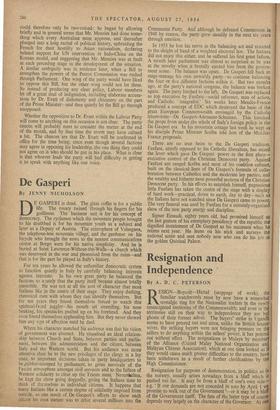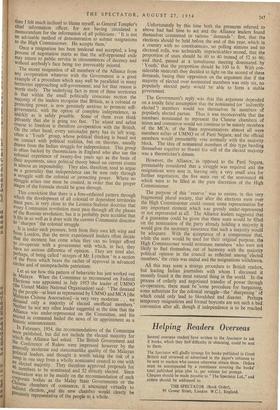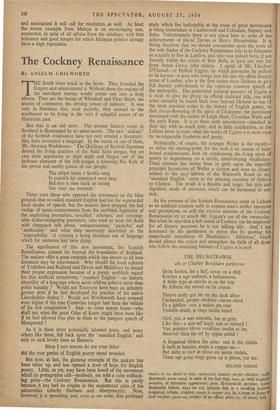Resignation and Independence •
By A. D. C. PETERSON RESIGN—Boycott—Hartal (stoppage of work), tha familiar watchwords must by now have a somewhat nostalgic ring for the Nationalist leaders in the newly emancipated territories of the Commonwealth; and even in the territories still on their way to independence they are buj ghosts of their former selves. The buyers' strike in Ugand3 seems to have petered out and since, unlike the British houses wives, the striking buyers were not bringing pressure on th44 sellers to do anything within the sellers' power, it has petere out without effect. The resignations in Malaya by memberyyyy of the Alliance (United Malay National Organisation ani Malayan Chinese Association), which at one time looked as they would cause much greater difficulties to the country, have been withdrawn as a result of further clarifications by the High Commissioner. time I felt much inclined to blame myself, as General Templer's chief information officer, for not having circulated a memorandum for the information of all politicians : It is not an advisable method of demonstration to submit resignations to the High Commissioner. He accepts them.'
Once a resignation has been tendered and accepted, a long process of negotiation starts so that the self-appointed exile may return to public service in circumstances of decency and Without anybody's face being too irrevocably injured.
The recent resignation of all members of the Alliance from any co-operation whatever with the Government is a good example of a procedure which may well be paralleled in many territories approaching self-government, and for that reason is worth study. The underlying fact in most of these territories is that within the small politically conscious section the majority of the leaders recognise that Britain, as a colonial or protecting power, is now genuinely anxious to promote self- government, with the option of complete independence, as quickly as is safely possible. Some of them even think privately that she is going too fast. The' wisest and safest course to freedom is therefore co-operation with the British. On the other hand, every nationalist party has its left wing, often a ' Youth ' group, whose political thinking is based not on contact with political realities, but on theories, usually drawn from the Indian struggle for independence. This group is often backed by theoreticians in England who also use the colonial experience of twenty-five years ago as the basis of their arguments, since political theory based on current events is almost an impossibility. They also, therefore, tend to argue as a generality that independence can be won only through a struggle with the colonial or protecting power. Where no struggle arises one must be created, in order that the proper stages of the formula should be gone through.
This conviction that there is a fore-ordained pattern through Which the development of all colonial or dependent territories must pass, is very close to the Leninist-Stalinist doctrine that every Communist revolution must pass through all the phases is of the Russian revolution; but it is probably pure accident that 10 it fits in as well as it does with the current Communist directive 10 to sharpen ' the colonial struggle. 10 It is under such pressure, both from their own left wing and from London, that the more experienced leaders often decide that the moment has come when they can no longer afford to co-operate with a government with which, in fact, they have no serious difference of opinion. They are tired also. Perhaps, of being called ' stooges of Mr. Lyttelton ' in a section of the Press which bears the cachet of approval in advanced circles and of unimpeachable patriotism.
Let us see how this pattern of behaviour has just worked out In Malaya. When the Committee to recommend on Federal Elections was appointed in July 1953 the leader of UMNO 10 the United Malay National Organisation) said: ' The demand at 1:13' the people—at least as represented by UMNO and MCA [the Malayan Chinese Association]—is very very moderate . . . we demand only a majority of elected unofficial members.' Neither he nor any other leader suggested at the time th5at the Alliance was under-represented on the Committee, and his 0 Second in command hailed the news of its appointment as a historic announcement.
In February, 1954, the recommendations of the Committee Were published, but did not include the elected majority for Which the Alliance had asked. The British Government and the Conference of Rulers were impressed however by the 10 generally moderate and statesmanlike quality of the Malayan political leaders, and thought it worth taking the risk of a lump in one step from a wholly nominated council to one with 4,11 elected majority. They therefore approved proposals for is 46 members to be nominated and 52 directly elected. Since nomination was to be mainly on the recommendation of such corporate bodies as the Malay State Governments or the Chinese chambers of commerce, it amounted virtually to Indirect election, sand the new chamber would clearly be >0 genuinely representative of the people as,a whole. Unfortunately by this time both the pressures referred to above had had time to act and the Alliance leaders found themselves committed to various ' demands ': first, that the elections should be held before the end of this year, which in a country with no constituencies, no polling stations and no electoral rolls, was technically impracticables second, that the proportion of seats should be 60 to 40 instead of 52 to 46; and third, passed at a tumultuous meeting dominated by ' Youth.' that the proportion should be 100 to 0. With con- siderable statecraft they decided to fight on the second of these demands, basing their opposition on the argument that if the majority of elected over, nominated members was only six, no popularly elected party would be able to form a stable government.
The Government's reply was that this argument depended on a totally false assumption that the nominated (or ' indirectly elected ') members would not themselves be members of popularly elected parties. Thus it was inconceivable that the members nominated to represent the Chinese chambers of mines and commerce would not continue to be mainly members of the MCA; of the State representatives almost all were members either of UMNO or of Parti Negara; and the official members would presumably vote normally with the majority block. The idea of nominated members of this type banding themselves together to thwart the will of the elected majority was a theoretician's dream.
However, the Alliance, as opposed to the Parti Negara: presumably considered that a struggle was required and the resignations were sent in. leaving only a very small area for further negotiation, the live seats out of the nominated 46 which were to be filled at the pure discretion of the High Commissioner.
The purpose of this ' reserve ' was to ensure, in this very fragmented plural society, that after the elections were over the High Commissioner could ensure some representation for any important element which was grossly under-represented or not represented at all. The Alliance leaders suggested that if a guarantee could be given that these seats would be filled on the nomination of the party already holding a majority it would give the necessary assurance that such a majority would be adequate. With the acceptance of a compromise that, while the seats would be used for their original purpose, the High Commissioner would nominate members ' who were not likely to find themselves out of harmony with the majority political opinion in the council as reflected among' elected members,' the crisis was ended and the resignations withdrawn.
All this may seem a strange procedure to British readers. but leading Indian journalists with whom I discussed it recently found it the most natural thing in the world. In the process of orderly and negotiated transfer of power through co-operation, there must be someprocedure for bargaining, some substitute for the colonial struggle—the ' sharpening' of which could only lead to bloodshed and disaster. Perhaps temporary resignations and formal boycotts are not such a bad, convention after all; though if independence is to be reached and maintained it will call for resolution as well. At least the recent example from Malaya is an encouraging one, conducted, in spite of all advice from the sidelines, with that tolerance and good temper for which Malayan politics already have a high reputation.




































 Previous page
Previous page